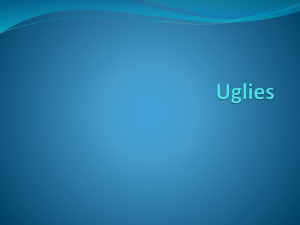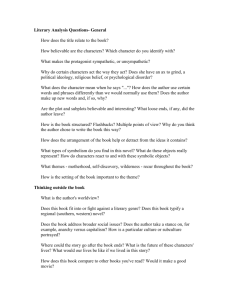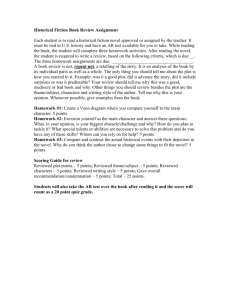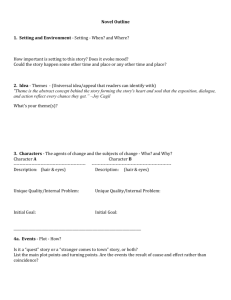passage from the novel - Coral Shores High School
advertisement
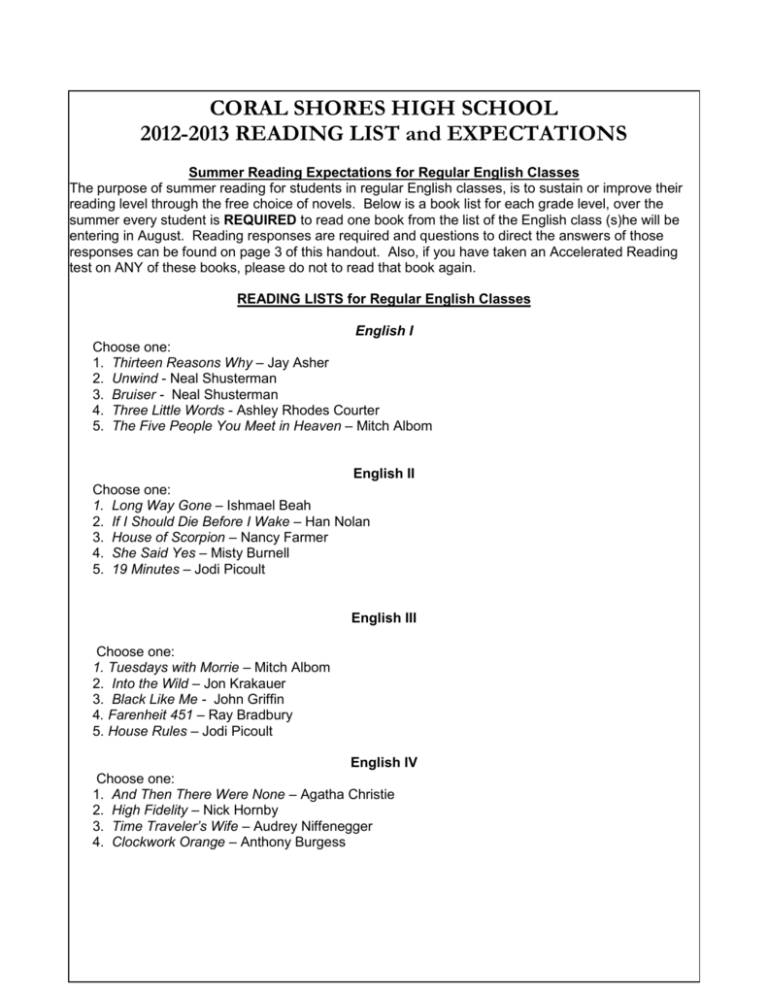
CORAL SHORES HIGH SCHOOL 2012-2013 READING LIST and EXPECTATIONS Summer Reading Expectations for Regular English Classes The purpose of summer reading for students in regular English classes, is to sustain or improve their reading level through the free choice of novels. Below is a book list for each grade level, over the summer every student is REQUIRED to read one book from the list of the English class (s)he will be entering in August. Reading responses are required and questions to direct the answers of those responses can be found on page 3 of this handout. Also, if you have taken an Accelerated Reading test on ANY of these books, please do not to read that book again. READING LISTS for Regular English Classes English I Choose one: 1. Thirteen Reasons Why – Jay Asher 2. Unwind - Neal Shusterman 3. Bruiser - Neal Shusterman 4. Three Little Words - Ashley Rhodes Courter 5. The Five People You Meet in Heaven – Mitch Albom English II Choose one: 1. Long Way Gone – Ishmael Beah 2. If I Should Die Before I Wake – Han Nolan 3. House of Scorpion – Nancy Farmer 4. She Said Yes – Misty Burnell 5. 19 Minutes – Jodi Picoult English III Choose one: 1. Tuesdays with Morrie – Mitch Albom 2. Into the Wild – Jon Krakauer 3. Black Like Me - John Griffin 4. Farenheit 451 – Ray Bradbury 5. House Rules – Jodi Picoult English IV Choose one: 1. And Then There Were None – Agatha Christie 2. High Fidelity – Nick Hornby 3. Time Traveler’s Wife – Audrey Niffenegger 4. Clockwork Orange – Anthony Burgess Summer Reading Expectations for Honors and Advanced Placement Classes The purpose of summer reading for students in honors or advanced placement classes is to expose them to various genres of literature which will help to facilitate classroom discussions and analyses throughout the course of the year. By doing so, this will help create a broad base of literary knowledge which is necessary when taking either of the Advanced Placement tests. Listed below are the required readings for each grade level. Students in English I and II Honors will read the book listed, students in Advanced Placement classes will read both books listed. ALL students are expected to arrive on the first day of school having read the books for the English class they are enrolled in. Students will be expected to think, analyze and write about what they are reading and the format for those written responses are on the next page. All reading lists and forms can be found on the Coral Shores web page along with a hyperlink to the Coral Shores Literary Terms. English I Honors 1. Catcher in the Rye – J.D. Sallinger English II Honors 1. Kite Runner – Khaled Hosseini Advanced Placement Language and Composition 1. How to Read Literature Like a Professor – Thomas C. Foster** 2. In Cold Blood – Truman Capote Advanced Placement Literature and Composition 1. The Awakening – Kate Chopin 2. Catch 22 – Joseph Heller ** AP Language and Composition students should read Foster’s book first and then apply that knowledge when reading In Cold Blood. A dialectical journal and book cover should be created for this book as well. ENGLISH I AND II Honors and I-IV Regular SUMMER READING NOVEL ANALYSIS QUESTIONS There are four basic components of the novel -Setting: details of place and time; atmosphere and mood the course of action including conflict and climax Plot: the story; tells what is happening in the novel such as events and experiences of the characters Character: person's behavior and developed personality Theme: author's message; point of view about human values implied by the action but not directly stated supported by the setting and characters Each component feeds or supports the other three to create a unified whole. These components are skillfully interwoven by the author. They all work around and support the concepts of protagonist (main character), conflict involving the protagonist (part of the plot which helps carry the theme), and opposing forces (inside and outside the protagonist also support the theme). At one point, the conflict in the novel reaches a climax and the story soon ends. The study of the novel also includes understanding the structure and development of the novel, the author's style and use of language, and literary devices apparent in the novel such as symbolism. FOR ALL regular English classes (I-IV)– Record the pages you read at each level, and answer one question for each level. Type or neatly write your answers and use complete sentences. Remember, more is better. FOR ENGLISH I AND II HONORS – answer each question at each level. Type or neatly write your answers in a notebook that you will turn in at the beginning of the school year. Level 1 Questions (for the early chapters of the book) 1. What is the time and place of the book? What evidence in the book tells you this? 2. Name and describe the main character in the book. Describe him/her physically and describe his/her personality and history, if known. Then give your impression of him/her. 3. Name and describe a minor character. Describe her/him physically and describe her/his personality and history, if known. Explain how s/he is important to the story and the ideas of the book. 4. Describe the nature of the relationship between two characters. Include their history together and details of their relationship. Explain the significance of their relationship to the book. 5. Describe one important event in the book and explain why it is significant to the story (to the plot, the characters, and to the ideas of the book). 6. Explain one specific aspect of the culture described in the book. Tell how it compares to a specific culture you are familiar with. 7. What are your feelings and thoughts about the novel based on one or more specific things you have read? 8. Find one specific idea, event, or behavior in the book that relates to real life. Explain the relationship you see. Level 2 Questions (for the middle chapters of the book) 1. If the time or place switches around during the book, explain how and give examples. How does this switching serve the story? 2. What is the general feeling or mood of the book? Give specific examples of how the author creates that feeling or mood. 3. Compare and contrast two characters psychologically. To do this, consider their behavior and personality. Consider whether their physical selves support or contrast with their psychological selves. 4. Choose two types of conflicts listed below and fully explain their development in the novel, giving examples of each: a. two people (man v. man) b. a person and his/her conscience (internal conflict) c. a person and society a person (man v. society) d. an animal or nature a person and a spiritual/supernatural being 5. Who is the narrator of the story? Is s/he inside or outside the story? What is her/his relationship to the story? 6. Is the book written in the first or third person (I or s/he)? How does that affect the story? 7. Explain the organization of the book. How it is important to the story? 8. What is your reaction to a relationship, event, socio-cultural behavior or message/theme of the book? Be clear about what you are reacting to and exactly what makes you respond as you do. 9. Choose a sentence or phrase that attracts you. Explain why you chose it, its value in the book and its value to you. Level 3 Questions (for the final chapters of the book) If there is any special language used (dialects, foreign words, slang, etc.) give examples and explain its use and purpose. What is its effect? Does the author use humor, irony, symbolism, or metaphors? Give examples and explain the effect. What is the peak event, the climax, of the novel? What major conflicts lead up to it and what is the resolution afterward? 1. What is the theme or themes in the novel? How does the author show this idea? Give evidence. Comment on how this theme fits in the novel and how it applies to life outside the book. What does this theme mean to you? 2. What did you learn from this novel? In answering this, you may comment on any aspect of the novel including how it is written. 3. What is the peak event-climax-of the novel? What major conflicts lead up to it and what is the resolution afterward? 4. Identify a theme or themes in the novel. How does the author show this idea? Cite evidence from the text. Comment on how this theme fits in the novel and how it applies to life outside the novel. What does this theme mean to you? (To address this question well, a multi-paragraph answer is suggested). 5. What did you learn from this novel? In answering this, you may comment on any aspect of thte novel including how it is written. THE LITERARY RESPONSE JOURNAL For AP Language and Literature Classes Reading response journals are reaction records you keep while reading. They are not complicated, and will help you keep track of important points in the text as you read. Relate plot, characters, setting to your personal experiences or to people you know—in life or in literature. Use colloquial, everyday language. Write down reactions as they occur to you. DO NOT summarize the passage. Directions: 1. Illustrate a cover for each complete response journal with significant representations of characters, events, and/or objects from your novels (SYMBOLISM). Place it on the front of your journal. 2. Create a table with three columns on your paper. 3. Label the first column “Passage from the Novel.” 4. Label the middle column “My Response.” 5. Label the last column “Literary Elements.” 6. Number each entry. 7. As you read, quote significant points from the text in the left column. Use parenthetical citation (MLA format) to record page numbers. You do not need to copy the entire passage, but enough of it to make sense to the teacher who checks your journal. 8. After you copy the passage, note in the middle column your reaction/response: Has the story taken an unexpected turn (PLOT, IRONY)? Have you found an important part of the author’s message (THEME)? What do you predict will happen (PREDICTION)? 9. Write as much as you can, but no less than six sentences per entry. 10. In the third column, indicate the literary device that your passage exemplifies. (A hyperlink to the Coral Shores literary terms list can be accessed through the summer reading page on the website.) 11. You must do a journal for each novel, and each journal must have a minimum of 10 entries. The entries should cover the entire novel. Grading Cover—Quiz grade Journal (must be typed or neatly written)—1 test grade for each novel Usage and mechanics will not be the main focus of the journal; however, if there appears to be a lack of effort on your part to make corrections then, points will be deducted. Following directions will be counted, as well as using correct MLA format for journal entries. Sample journal entry Animal Farm by George Orwell PASSAGE FROM THE NOVEL MY RESPONSE 1. “The pigs did not actually work, but directed and supervised the others. With their superior knowledge it was natural that they should assume the leadership …” (Orwell 35) Hmmm…sounds like the pigs are getting ready to put one over on the other animals. How can they be so stupid? This reminds me of the stupid crowds of commoners in Julius Caesar. Are uneducated people really fit to govern themselves? 2. “He (Napoleon) had seemed to Sounds like Napoleon revises the oppose the windmill, simply as a truth. Who really is the dangerous maneuver to get rid of Snowball, who character—Napoleon or Snowball? was a dangerous character…The And those dogs…they seem to animals were not certain, what the represent the secret police of Russia word meant, but…the three dogs who and will probably help Napoleon happened to be with him growled so maintain control over the animals. threateningly, that they accepted his explanation…” (62) LITERARY ELEMENT character allegory character Possible response beginnings-1. 2. 3. 4. 5. 6. I think this setting is important because.... (setting) I like the way the author... (style) I predict that… (prediction) This story teaches....(theme) The story is ending/not ending the way I wanted …(possible situational irony) This situation John finds himself in the story alludes to the Cain and Abel story in the Bible when… (allusion) 7. Elizabeth is an appropriate name for this character since Elizabeth’s name symbolizes … (symbolism, character) Literary Elements to consider (A more extensive list of literary terms can be accessed through the summer reading list on the website, feel free to experiment with those you may not be as familiar with.) Plot Symbolism Character Theme Allegory Setting Irony (dramatic, verbal, irony of situation) Allusion Conflict Author’s purpose


